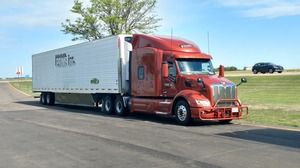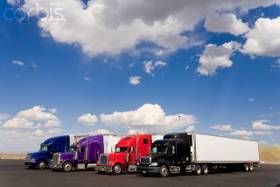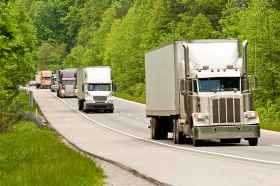Reefer Vs. Flatbed Vs. Dry Van
Topic 1051 | Page 2

And I'll add, that with 102 (spread axle) trailers, some of them have a lift for the front set of tandems (ours did). So we would pick up those front tandems, and park that trailer anywhere we wanted it ...
Better yet, I can dump the air out of my back axle, and it trailers like about a 35 footer. Very handy for cornering and backing.
Tandems:
Tandem Axles
A set of axles spaced close together, legally defined as more than 40 and less than 96 inches apart by the USDOT. Drivers tend to refer to the tandem axles on their trailer as just "tandems". You might hear a driver say, "I'm 400 pounds overweight on my tandems", referring to his trailer tandems, not his tractor tandems. Tractor tandems are generally just referred to as "drives" which is short for "drive axles".
Tandem:
Tandem Axles
A set of axles spaced close together, legally defined as more than 40 and less than 96 inches apart by the USDOT. Drivers tend to refer to the tandem axles on their trailer as just "tandems". You might hear a driver say, "I'm 400 pounds overweight on my tandems", referring to his trailer tandems, not his tractor tandems. Tractor tandems are generally just referred to as "drives" which is short for "drive axles".
HOS:
Hours Of Service
HOS refers to the logbook hours of service regulations.
Is lifting/dumping air out of 1 of your axles when you are loaded a good idea? Seems to me you would be putting all the weight onto 1 set of air bags & possibly blowing them out with it being over weight. Just does not seem like a good idea to do that when the trailer is loaded, especially when the back of your trailer is loaded to almost max weight of 40,000 LBs
Also, would that not put a lot of undue stress on that one axle as you are turning?
Ernie
OWI:
Operating While Intoxicated

If you dump the air, and/or raise the axle, for a short time, to make a maneuver, its not a danger. We have run empty with the axle raised. But usually don't. Since the 102 can legally have 40k on the split axles, it is a different deal, that you have to think about before picking up/dumping the air on that axle. But it sure beats dragging that axle around a corner, or spinning the trailer and knocking the alignment out of that axle by dragging it. We never get out of granny gears with a load on, and an axle up...TSB would likely have a hissy fit....But I've never seen one...so that might be quite entertaining  .
.

Hey Steve,
I've been driving a dry van for about 7 months now, and I had to pull my first Reefer trailer last week. One of my fellow drivers who usually drives dry van had to pull the reefer for about a week, and he said that all his loads were live loads, and they all took at least 4-6 hours. I only had to pull it for the one load and I was unloaded quickly, so I can't say for sure; but a lot of that depends on which company you work for, and what types of customers they have. I felt like the fueling of the reefer tank wasn't difficult, but it did add time to my fuel stop, and then I had to wash it out.
I'm guessing that most of the time you can take it to a truck wash and they wash it out for you, but because I was returning it to one of the terminals, I was expected to use the wash bay and wash it out myself. No problem, but... The power hose I was using had a leak that hit the inside of my left ankle and drained into my shoe. (Did you know that waterproof shoes are only waterproof from the outside?) So, after I was about 1/2 way done washing it out, the power hose turns off, and I have to climb out of the back of the trailer and go hit the button to turn the water back on. Okay, so I'm like knee-high to a grass hopper, so when I say "climb" out of the trailer, I really mean "climb", well as it turns out, there isn't really anyway to climb out of a soaking wet trailer without getting soaked. Needless to say...
by the time I was finished washing out my trailer, I looked like a drowned rat, and felt like a raisin.
So, after I was about 1/2 way done washing it out, the power hose turns off, and I have to climb out of the back of the trailer and go hit the button to turn the water back on. Okay, so I'm like knee-high to a grass hopper, so when I say "climb" out of the trailer, I really mean "climb", well as it turns out, there isn't really anyway to climb out of a soaking wet trailer without getting soaked. Needless to say...
by the time I was finished washing out my trailer, I looked like a drowned rat, and felt like a raisin. 
So for me, with there being no extra pay for pulling reefers, but the added time and work of keeping it fueled, cleaned, and at the correct temperature, plus the increase in the number of live loads, which means more backing into tight docks, and generally increased wait times, it just didn't seem like something that I would enjoy doing, or would want to do on a regular basis. I'm sure if I was asked to pull one, that I would be able to adjust to the changes and it wouldn't be a big difference; but for now, I feel like I have enough to learn.
Just my experience. Hope that helps. 
Julia
Terminal:
A facility where trucking companies operate out of, or their "home base" if you will. A lot of major companies have multiple terminals around the country which usually consist of the main office building, a drop lot for trailers, and sometimes a repair shop and wash facilities.
Dry Van:
A trailer or truck that that requires no special attention, such as refrigeration, that hauls regular palletted, boxed, or floor-loaded freight. The most common type of trailer in trucking.Reefer:
A refrigerated trailer.
HOS:
Hours Of Service
HOS refers to the logbook hours of service regulations.Hey Julia - I just wanted to say that was really helpful! Your assessment, even after just one load, was the same way I felt about refrigerated. I hauled a mix of dry van and refrigerated for TRL years ago. I loved getting to go coast to coast so often with the refrigerated fleet, but I thought there were an awful lot of headaches involved with it that made dry van a bit nicer.
If you want to run a lot of coast to coast, refrigerated is where it's at. But dry van has fewer headaches overall.
Dry Van:
A trailer or truck that that requires no special attention, such as refrigeration, that hauls regular palletted, boxed, or floor-loaded freight. The most common type of trailer in trucking.DAC:
Drive-A-Check Report
A truck drivers DAC report will contain detailed information about their job history of the last 10 years as a CDL driver (as required by the DOT).
It may also contain your criminal history, drug test results, DOT infractions and accident history. The program is strictly voluntary from a company standpoint, but most of the medium-to-large carriers will participate.
Most trucking companies use DAC reports as part of their hiring and background check process. It is extremely important that drivers verify that the information contained in it is correct, and have it fixed if it's not.

Ok so I'm new to the reefer. I'm going on Monday to work with CRE and this will be my first time with reefers and I had no idea about the fueling and pumping. It doesn't seems like a big deal when you have to put fuel, but the prime and battery issue can be a pain. I hope is not a very common issue.
You listed cleaning out a reefer as a con, but really it's not that big a deal. Most big companies will pay to have the trailer washed out between loads, and virtually every truck wash in the country does trailer washouts, so finding a place to get it done isn't all that hard. It can be a painus in the anus sitting in line at a truck wash waiting to get it done, but it isn't exactly labor-intensive. And if the trailer isn't really bad enough to require a full washout, a quick 5 minutes with a push broom will get the pallet chunks and dust out. And when it's 90° out and you've just finished delivering a load that was kept at -10°, that 5 minutes in that nice cool box can be quite pleasant.
Now if you want a *real* con to pulling a reefer, there's two things you'll occasionally have to do that are a real...um...female pooch. Priming and jumping the reefer unit itself. You'll go to pick up a trailer somewhere and find that the guy who dropped it didn't bother to fuel it, and now not only do you have to fill the tank, but you get the indescribable joy of spending the next 15+ minutes pumping this stupid little 3 inch knob back and forth to prime it to get it started, and then you have to keep pumping away for another 2 or 3 minutes to make sure it keeps running. Or you'll pick up a trailer with the unit shut off, and when you try to fire it up the battery's too flat to crank the motor over. So now you get to scuttle back and forth between the engine compartments of your truck and the reefer hooking up jumper cables and hoping the battery will jump and keep going after the jump.
Oh, and you'll have to do silly little things like add oil every once in a while, but that's not such a hassle. No worse than putting oil in the truck, really.
Also, fuelling reefers isn't so much of a much. If you never let it get below 1/2 a tank, it doesn't take more than an extra 2 or 3 minutes to top it off when you're filling the truck.
Reefer:
A refrigerated trailer.
Ill make this really simple.
If you enjoy playing warehouse and lumper games pull reefer or van.
Flat bed gets unloaded in minutes
Reffer and van....can be hours and hours. Then you might have to get w washout.
Reefer is just another piece of machinery to break down. Also, if the reefer isnt working correctly the receiver might not accept the load. Now enjoy more warehouse fun.
Receivers LOVE to make drivers play "warehouse worker." If you load is unloaded and is on perfectly good pallets the receiver might make you re-palatalize the load so it will fit on their shelves. YOU HEARD ME CORRECTLY! Despite your load being on the dock and in good condition you now must play warehouse worker, or hire someone to do it for you. Now you will be delayed even longer.
Unless the loads are drop and hook you can take the reefers and cram em really deep.
Reefer:
A refrigerated trailer.
Drop And Hook:
Drop and hook means the driver will drop one trailer and hook to another one.
In order to speed up the pickup and delivery process a driver may be instructed to drop their empty trailer and hook to one that is already loaded, or drop their loaded trailer and hook to one that is already empty. That way the driver will not have to wait for a trailer to be loaded or unloaded.
Ill make this really simple.
If you enjoy playing warehouse and lumper games pull reefer or van.
Flat bed gets unloaded in minutes
Reffer and van....can be hours and hours. Then you might have to get w washout.
Reefer is just another piece of machinery to break down. Also, if the reefer isnt working correctly the receiver might not accept the load. Now enjoy more warehouse fun.
Receivers LOVE to make drivers play "warehouse worker." If you load is unloaded and is on perfectly good pallets the receiver might make you re-palatalize the load so it will fit on their shelves. YOU HEARD ME CORRECTLY! Despite your load being on the dock and in good condition you now must play warehouse worker, or hire someone to do it for you. Now you will be delayed even longer.
Unless the loads are drop and hook you can take the reefers and cram em really deep.
In my entire time I've yet to ever touch my freight besides putting a load lock or two on. And while the delay is bad, there is detention pay. I'm usually sleeping while I'm being unloaded. And after that second hour I start making almost 20$ per hour while I sleep. I also have no complaints about the lumpers, it literally takes 5 minutes to write and complete a comcheck.
Reefer:
A refrigerated trailer.
Drop And Hook:
Drop and hook means the driver will drop one trailer and hook to another one.
In order to speed up the pickup and delivery process a driver may be instructed to drop their empty trailer and hook to one that is already loaded, or drop their loaded trailer and hook to one that is already empty. That way the driver will not have to wait for a trailer to be loaded or unloaded.

Old School, you forgot about some of the lovely places that you get to deliver to. Like 15 miles down a dirt road to a farmers field just after a snow melt. Or 20 miles down a dirt road in the middle of no where with just enough room to turn around, maybe.
Up here, at least, we haul a lot of concrete pipe and manholes. When we deliver them it would be better to get gps coordinates as they are usually construction areas with one way in and out. You will be doing a lot of backing just to get turned around so you can get home. You should have seen the yard where we pick up 12' diameter tanks.
For flatbedding, If you absolutely hate heat, cold, rain or snow, one of these, then flatbedding is not for you. Flatbedding does usually pay more because of all the extra stuff you have to do.
New Reply:
New! Check out our help videos for a better understanding of our forum features

















Preview:
This topic has the following tags:
Swift Transport Choosing A Trucking Company Dry van Flatbed Life On The Road Refrigerated Tips For Backing Truck Driving Lifestyle Truck Equipment







 TT On Facebook
TT On Facebook
And I'll add, that with 102 (spread axle) trailers, some of them have a lift for the front set of tandems (ours did). So we would pick up those front tandems, and park that trailer anywhere we wanted it ...
Tandems:
Tandem Axles
A set of axles spaced close together, legally defined as more than 40 and less than 96 inches apart by the USDOT. Drivers tend to refer to the tandem axles on their trailer as just "tandems". You might hear a driver say, "I'm 400 pounds overweight on my tandems", referring to his trailer tandems, not his tractor tandems. Tractor tandems are generally just referred to as "drives" which is short for "drive axles".
Tandem:
Tandem Axles
A set of axles spaced close together, legally defined as more than 40 and less than 96 inches apart by the USDOT. Drivers tend to refer to the tandem axles on their trailer as just "tandems". You might hear a driver say, "I'm 400 pounds overweight on my tandems", referring to his trailer tandems, not his tractor tandems. Tractor tandems are generally just referred to as "drives" which is short for "drive axles".
HOS:
Hours Of Service
HOS refers to the logbook hours of service regulations.